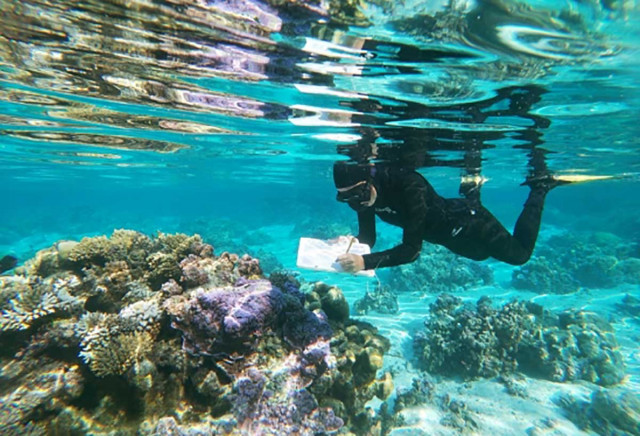Supporting Solutions

Schmidt Environmental Solutions Fellows program receives additional two years of funding to support 23 students in environmental science
By Shelly Leachman
Aiming to foster high-impact research on everything from machine learning techniques for early locust swarm detection, to understanding the impact of algal blooms across the Atlantic Ocean, to reducing microplastic pollution in stormwater, Eric and Wendy Schmidt have extended by two more years their funding for the Schmidt Environmental Solutions Fellows at UC Santa Barbara.
Launched in 2019, the program means to leverage the power of science to pioneer tangible solutions to the most pressing environmental problems facing our communities and our planet. The inaugural cohort of 32 undergraduate and graduate students and postdoctoral researchers is already making an impact with projects including research on how to improve the design of mobile apps to help African farmers gain access to data that better protects their livelihoods and environment; and insights on the type of corals most vulnerable to coral bleaching to aid coral management in a rapidly warming ocean.
With support from philanthropists Wendy Schmidt and her husband, Eric, through The Schmidt Family Foundation, the fellows program was established in response to a significant reduction in federal funding available to doctoral students in environmental and ecological science. The Schmidt Environmental Solutions Fellowship also provides funds for early career Ph.D. students at UC Santa Barbara and for undergraduate students to partner with those same doctoral students to conduct research in the laboratory or in the field. The new funding commitment follows the success of the first cohort.
“The insights we gain from environmentally focused research and the technology development that accompanies it can help to restore our earth and ocean systems and provide opportunities on a global scale,” said Wendy Schmidt, president and co-founder of The Schmidt Family Foundation and co-founder of Schmidt Ocean Institute. “I am encouraged by the achievements of these students and eager to see the impact of the next cohort. This next generation of students are leading a smart path forward to a healthy and prosperous planet.”
Douglas McCauley, an associate professor in UC Santa Barbara’s Marine Science Institute, oversees the fellowship program. He said he is especially pleased with the program’s extension amidst a global pandemic that further highlights the need for good science to solve the grand challenges facing the planet and humanity.
“The timing of this renewal of the Schmidt Environmental Solutions Fellows program could not have been better,” McCauley said. “While COVID-19 has created significant new challenges for UCSB researchers, the threats facing our environment and affecting our well-being have not gone away.”
According to McCauley, an explicit aim of the 2020 Environmental Fellows Program is to provide financial support for students and researchers on campus to quickly adapt, in the face of COVID-19, to new research approaches and even new questions — pivoting, for example, from international summer field research to developing new techniques for using satellites to remotely study their ecosystems.
“A silver lining,” McCauley added, “is that this funding is empowering our students to develop some exciting and novel digital research techniques that are helping us remotely study our planet. This new toolkit seems likely to transform the way we do environmental problem-solving in ways that create value well beyond the COVID-19 era.”
The diverse 2020 cohort of Schmidt Environmental Solutions Fellows is tackling a wide range of pressing topics, from climate change to light pollution. Like previous fellows, the students will share their discoveries in a series of open community fora and receive intensive training in science communication increasing their abilities to share results with policy makers and communities.